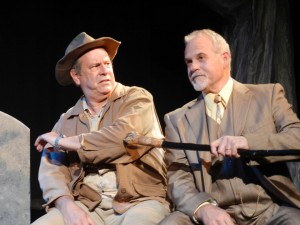Slow-moving script weighs down Alabama Baggage
Theater giant Anton Chekov once wrote, “One must not put a loaded rifle on the stage if no one is thinking of firing it.” This rule, affectionately known as Chekov’s Gun, is the fundamental instruction regarding theatrical foreshadowing.
If only Chekov had included a few addendums to the rule, such as make sure the gun’s presence actually makes sense, is necessary and isn’t dumb.

Baggage control · William Jones (Judge Bailey, right) stands out through his energetic, yet brief performances as the judge who oversees the trial of the central figure of Alabama Baggage, the unrepentant John Combs, left. – Courtesy of Doug Dobransky & Nick Weber
Alabama Baggage, a play by Buddy Farmer that’s making its world premiere at Theatre Asylum on Santa Monica Boulevard, follows the gospel of Chekov’s Gun. There is a gun, and it is fired. A lot. But considering the gun only distracts from the relatability of the performance, should the gun even be present at all?
The plot of Farmer’s piece should be compelling enough: A model citizen of a small town in Kentucky is exposed as a child molester after his death, but two of his former victims discover that he is still alive and struggle with how to exact their revenge. There’s a laundry list of juicy topics to work with here: the South, small-town politics, faking one’s own death, blackmail, racial tension and child abuse. These are the kinds of themes that should win people Tony awards. So why does this play end up falling flat?
The first problem seems to be with Farmer’s script. Though the premise of the story looks pretty good on paper, his follow-through is disappointing. Instead of creating believable three-dimensional characters who deal with their emotions in tense, visceral moments, the confrontations end up playing out like scenes from an after-school special.
For example, the character of Ben, a black cop who was a victim of molestation, is entirely wholesome throughout the play and never displays any hints of darkness or capacity for change. Ben might be a model citizen in the real world, but on stage, he’s bland and tough to relate to.
The same goes for the molester’s widow, Miss Helen. Aside from the fact that she has very little dialogue, her character has no opportunities to be dynamic. And as the play’s only female character, some shady implications pop up regarding the role of mothers in child abuse cases.
The script could have been saved by the presence of skilled actors, but unfortunately, those are scarce in this production. Will Blagrove delivers a few jokes that earned some laughs from the audience, but overall he struggles to make his character consistently stimulating. William Jones’ Judge Bailey is highly intriguing, but he was only on stage for approximately eight minutes. Ashley McGee, in his interpretation of Lucas, clearly meant to embody a kind-hearted Average Joe-type, but his painfully slow lines made for more of a pitiable country hick than a sympathetic everyman.
This combination of an underdeveloped script and misguided acting proved lethal. In the program’s playwright bio, it is made clear that Farmer has a heavy personal stake in the play’s subject matter.
Incidentally, even though it’s obvious that Farmer and the rest of the creative team had the best of intentions, the low quality of this production resulted in a tone that wasn’t nearly serious enough for hugely controversial topics such as child molestation.
That being said, there may be some hope for possible future reincarnations of Alabama Baggage. This production wasn’t completely devoid of assets.
In the pre-show speech, for instance, the stage manager asks that audience members “silence all cell phones, harmonicas and cowbells” during the show. Maybe if the script incorporated more Southern flavor like this (while of course being careful not to get overly corny), the audience would be able to better enjoy the rich setting.
Similarly, as mentioned above, the character of Judge Bailey holds so much untapped potential; if Farmer could include the judge in more scenes and give him loads more fiery dialogue, Jones’ energetic performance could alter the action’s flow for the better.
In fact, expanding the central conflict to more directly include additional, quicker conversations between several characters could do wonders for the show’s dragging pace, lifting the burden from the two main characters.
Instead, the fundamental flaw to this play is that the tension jumps much too quickly and rarely for the right reasons. From the moment Ben walks out in his police uniform complete with pistol holster, it’s clear that things are about to get real dramatic. But in dealing with issues as colossal as child abuse and racism, perhaps it would be best to tell a story that relies less on guns and faking deaths and instead placed these problems in a more realistic, lower-octane context.
Alabama Baggage has much room for growth. Hopefully, with the help of a few modifications, this play can someday realize its capacity to resonate with audiences. Baggage this heavy deserves to be packed a little more carefully.
